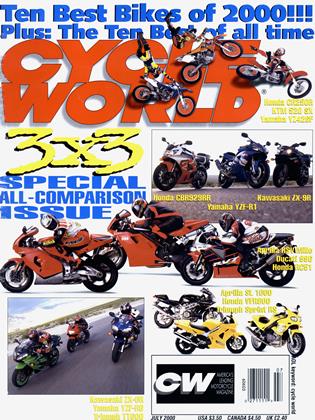Hunter's Guide
So, you want an old bike...
MOST ENTHUSIASTS WOULD DISCOVER A RESTORATION PROJECT LIKE Alan Chalk's about three sizes too larqe. So here's a little guidance for those who have stared into the mirrored finish of celestial handiwork and wondered how ordinary mortals should proceed.
Follow your heart: You must have a powerful attraction to any motorcycle that might become your restoration project. What’s appealing about a certain model probably has a lot to do with your motorcycling history-a machine that bewitched you long ago; a bike you found knock-down gorgeous; or a motorcycle with an exhaust note that left your ears ringing and your soul spellbound. Remember, the attraction is as much about you as it is about the motorcycle.
Write your own ruiebook for enjoyment. What’s your pleasure? If you love the way a bike looks, then display it. Static garage art is legitimate. Perhaps how a machine sounds or works is your thing. Then ride it and enjoy. Fine old motorcycles are about whimsy and happiness.
Research before buying: Assuming you know your heart’s delight, investigate both generally and specifically. Books and reference works often provide the basic background necessary to make informed choices. Some old motorcycles, researchers will learn, are more fun to look at than ride. That’s good to know before the thing comes to rest in your garage. Suppose your investigation reveals the machine you fancy is exceedingly rare and you don’t want a 10-year project. Being warned off early will be priceless to your mental health.
Machines manufactured in some significant quantities are normally the ones fondly remembered and later sought. Even though you might clearly recall a particular motorcycle from the time you were 10 or 15 years old, amass all possible information, including photographs, parts books, sales brochures, magazine articles, etc. Know what parts make up a complete, specific model and what characteristic problems, if any, the model had. Solid knowledge ought to keep you from rushing pell-mell into a partial bike or a parts heap.
Embrace wholeness: Buy the best, most complete bike you can turn up. Basically, this approach saves time and aggravation and money. In unusual cases, you may find and can afford exactly what you’re seeking. In those situations, you can likely buy a concours-winning motorcycle at a price less than the cost of an alternative example and its restoration. Always be patient and careful.
Avoid the investment mindset: The Nineties prosperity has fostered the idea that there’s profit in everything. Old motorcycles are not a business or a profit-making pastime for most enthusiasts. Stick to conventional investment instruments for real adventures in capitalism.
The enjoyment of a veteran motorcycle should be sufficient reason to justify spending on it. Some collectors feel it necessary to defend themselves with the “good investment” argument. Spouses and girlfriends regularly hear this justification long after they’ve grown immune and know it isn’t true. So stop talking about it.
Do what makes you happy: How many flawless 1957 Ducati 175 Sports does the world actually need? Well, at least one, and Mr. Chalk has provided that. Absolute correctness makes him happy. Not everyone has such standards for enjoyment, and nowhere is it written that they should. In having something less perfect and correct, other people-let us hope-will find as much joy and fulfillment as Alan Chalk has.
Phil Schilling
 View Full Issue
View Full Issue
More From This Issue
-
 Up Front
Up FrontThe Ten Rest, 2000
July 2000 By David Edwards -
 Leanings
LeaningsThe Perfect Baja Bike
July 2000 By Peter Egan -
 TDC
TDCCounting Cracks
July 2000 By Kevin Cameron -
 Departments
DepartmentsHotshots
July 2000 -
 Roundup
RoundupFriedel Münch Strikes Again
July 2000 By Kevin Cameron -
 Roundup
RoundupAprilia Buys Moto Guzzi
July 2000 By Bruno De Prato







